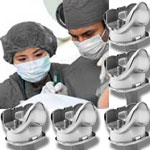Proposed FDA Regulation Would Require Unique Identifying Code to Track Implants
 In response to the large number of lawsuits and reports of serious complications from various medical implants, including reported Zimmer knee problems from NexGen CR-Flex knee implants, FDA has proposed a new regulation that would require all new medical devices to have unique device identifiers, or UDIs.
In response to the large number of lawsuits and reports of serious complications from various medical implants, including reported Zimmer knee problems from NexGen CR-Flex knee implants, FDA has proposed a new regulation that would require all new medical devices to have unique device identifiers, or UDIs.
These identifiers would be unique letter-and-number codes, so that if a problem was found with a particular type of implant, it would be very easy to spread the word about which specific implant was affected. A UDI system would enable more accurate adverse event reports and make it easier for the FDA to both identify which models were prone to complications, as well as to more accurately analyze the information. The proposed system would also be helpful for doctors by enabling them to quickly and easily look up information on a specific model. In addition, it would make health databases more consistent and reduce errors, simplify the recall process by creating a standardized identifier for all recalls, and make it more difficult to counterfeit devices.
FDA seeks feedback on proposal
Before deciding whether or not to implement the proposed plan for UDIs, the FDA is soliciting feedback from physicians and from the public. The health agency plans to gather information and feedback for four months, and then review its findings before making a final determination on whether to adopt the proposed regulation for a UDI system.
Complications reported from Zimmer NexGen knee
Having such a UDI system in place might have made it easier and simpler to disseminate information about the Zimmer NexGen knee when reports of complications from that implant began pouring in. Although knee replacements are typically expected to last 15 years or more, many patients have complained that the NexGen failed within just a few years. Numerous lawsuits have been filed over these complications, which include pain, immobility, failure of the implant to bond with the patient’s bone, dislocation, and metallosis (metal poisoning). Many patients who have experienced such complications have been forced to undergo Zimmer knee revision surgery.
Despite numerous lawsuits and reports of complications, no Zimmer knee replacement recall has been implemented.
[SmartLink zimmerkneelawsuit]

